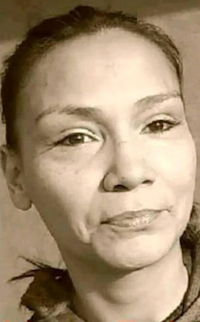SEATTLE — The FBI’s Seattle Field Office is offering a $10,000 reward for information relating to the disappearance of Mary Davis Johnson (Tulalip) who has not been seen since Nov. 25, 2020.

Johnson was last seen walking on the Tulalip Indian Reservation, near Marysville, Wash. Johnson was reportedly walking to a friend’s house and never arrived.
Want more Native News? Get the free daily newsletter today.
She was reported missing by her ex-husband on Dec. 9, 2020.
Johnson is described as 5-foot-6, 115 pounds, with a sunburst-type tattoo on her upper right arm. She was 39 years old when she disappeared.
The FBI, which is working with the Tulalip Tribal Police on the investigation, is offering a reward of up to $10,000 for information leading to the identification, arrest, and conviction of person(s) responsible for Johnson’s disappearance.
In a report released in June 2019 by the Urban Indian Health Institute, a division of the Seattle Indian Health Board, Washington state ranked second in the nation for cases of missing Indigenous women. The city of Seattle ranked first in the nation for missing and murdered Indigenous women and girls.
Anyone with information about the whereabouts of Johnson should call the FBI Seattle Field Office at 206-622-0460 or go to tips.fbi.gov.
Johnson's story was shared on TULALIP TV, a cable channel providing programming to Native households and subscribers to Tulalip Broadband. To view, watch below:
SOURCE: tiʔiɫ ʔəsx̌ʷiĺ (The Missing): Mary Davis Johnson from TULALIP TV on Vimeo.
More Stories Like This
Native News Weekly (August 25, 2024): D.C. BriefsNavajo Nation Mourns the Passing of Former Vice President Rex Lee Jim
Deb Haaland Earns Endorsement From Communications Workers of America Local 7076
University Soccer Standout Leads by Example
Two Native Americans Named to Democratic Congressional Campaign Committee's“Red to Blue” Program
Help us defend tribal sovereignty.
At Native News Online, our mission is rooted in telling the stories that strengthen sovereignty and uplift Indigenous voices — not just at year’s end, but every single day.
Because of your generosity last year, we were able to keep our reporters on the ground in tribal communities, at national gatherings and in the halls of Congress — covering the issues that matter most to Indian Country: sovereignty, culture, education, health and economic opportunity.
That support sustained us through a tough year in 2025. Now, as we look to the year ahead, we need your help right now to ensure warrior journalism remains strong — reporting that defends tribal sovereignty, amplifies Native truth, and holds power accountable.
 The stakes couldn't be higher. Your support keeps Native voices heard, Native stories told and Native sovereignty defended.
The stakes couldn't be higher. Your support keeps Native voices heard, Native stories told and Native sovereignty defended.
Stand with Warrior Journalism today.
Levi Rickert (Potawatomi), Editor & Publisher

